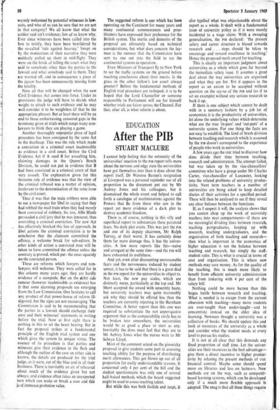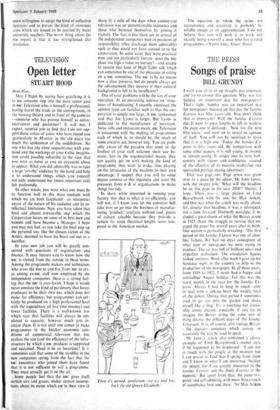After the PIB
EDUCATION STUART MACLURE
I cannot help feeling that the extremity of the universities' reaction to the NB report tells more
about the nervous and edgy state the universities have got themselves into than it does about the report itself. Dr Winston Barnes's resignation at Liverpool was a personal rejoinder out of all
proportion to the document put out by Mr Aubrey Jones and his colleagues, but it
dramatised the whole event and helped to call forth a catalogue of recriminations against the Powers that Be from those who saw in the report yet more evidence of a dark plot to destroy academic freedom.
There is, of course, nothing in this silly and superficial report to substantiate these paranoid fears. No dark plot exists. This was just the pia and one of its deputy chairmen, Mr Ralph Turvey, at their worst. It has certainly done
them far more damage that. it has the univer- sities. A few more reports like this—naive and arrogant at the same time—and the PIB will have exhausted its usefulness.
And yet, even after discounting unreasonable fears and the nervousness induced by student unrest, it has to be said that there is a great deal
in the PIB report for the universities to object to. Not least, the new pay scales, which are
distinctly mean, particularly at the top end. Mr Short accepted the award with unseemly haste, but university teachers may quite reasonably ask why they should be offered less than the teachers are currently rejecting in the Burnham Committee. A better report than this one was required to substantiate the not unpersuasive argument that as the comparability circle has to be broken into somewhere, the universities would be as good a place to start as any. Inevitably the dons must feel that they are to Mr Aubrey Jones what the nurses were to Mr Selwyn Lloyd.
Most of the comment seized on the gimmicky proposal to give students some part in assessing teaching ability for the purpose of distributing merit allowances. This got blown up out of all proportion for easily understandable reasons. It concerned only 4 per cent of the bill and the student questionnaire was only one of several half-baked methods which the board suggested might be used to assess teaching talent.
But while this was both foolish and inept, it also typified what was objectionable about the report as a whole. It-dealt with a fundamental issue of university policy as if it were merely incidental to a wage claim. With a sweeping generalisation, the Pm declared: 'the present
salary and career structure is biased towards research and . . . steps should be taken to encourage and reward excellence in teaching.' Hence the proposed merit award for teaching.
This is clearly an important judgment about universities as a whole which goes far beyond the immediate salary issue. It assumes a great deal about the way universities are organised and what they are for. Yet it appears in the
report as an axiom to be accepted without question on the say-so of the PIB and (as if to set an example) without any serious research to back it up.
If there is one subject which cannot be dealt with in a summary fashion by a job lot of economists it is the productivity of universities,
let alone the underlying values which determine what are the true 'in-puts' and 'out-puts' of a university system. For one thing the facts are not easy to establish. The kind of brash division between teaching and research which is assumed by the PIB doesn't correspond to the experience of people who work in universities.
A few years ago the UGC tried to discover how dons divide their time between teaching,
research and administration. The attempt failed, but was taken up by the vice-chancellors' committee who have a group under Mr Charles Carter, vice-chancellor of Lancaster, looking into the related problems of university produc- tivity. Next term teachers in a number of universities are being asked to keep detailed diaries of their activities for a specified period. These will then be analysed to see if they reveal any clear balance between the functions.
If, as I suspect it will, the analysis shows that you cannot chop up the work of university teachers into neat compartments—if there are no meaningful dividing lines between research, teaching postgraduates, keeping up with research, teaching undergraduates, and the
organisation of both teaching and research— then what is important in the economics of higher education is not the balance between teaching and research, but simply the staff-
student ratio. This is what is crucial in terms of cost and organisation. This is where new methods may save money. As for the quality of the teaching, this is much more likely to benefit from efficient university administration than from tinkering with 4 per cent of the salary bill.
Nothing could be more barren than this bogus battle between research and teaching.
What is needed is to escape from the current obsession with teaching—many more students are over-taught than under-taught—and to concentrate instead on the older idea of learning. Newman thought a university was a collection of books. We should update this and look at resources of the university as a whole and consider what the student needs at every level to pursue his studies.
It is not at all clear that this demands any fixed proportion of staff time. Let the univer- sities use their resources to the best advantage— give them a direct incentive to higher produc- tivity by relaxing the present methods of troc financial control. Maybe some should spend more on libraries and less on lecturers. New methods are on the way, such as comput0i= based learning systems, which can be developed only if a much more flexible. -approach Is adopted. The snag is that all these things require
more willingness to adopt the kind of collective decisions and to pursue the kind of economic aims which are bound to be resisted by many university teachers. The worst thing about the Pm report is that it has strengthened this resistance.



































 Previous page
Previous page